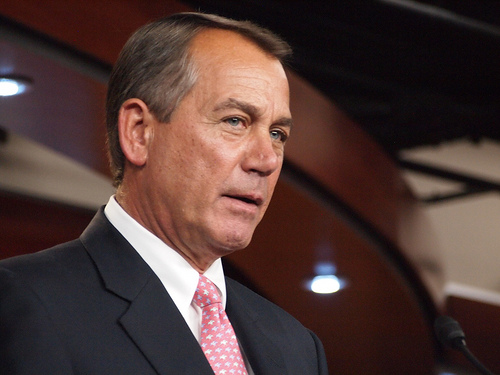Why Assad Won’t Use His Chemical Weapons
And why you should still be worried.
BY CHARLES P. BLAIR

How to explain the fiscal cliff to non-Americans

The first problem is the notion of the cliff itself. It, of course, exists because the members of congress agreed that if they couldn't agree on policies and procedures to reduce the U.S. federal budget deficit and the long term trajectory of U.S. national debt by the end of this year, they would automatically allow a doomsday scenario to unfold. That scenario would allow President George W. Bush's tax cuts to automatically lapse and be replaced by the marginal tax rates that obtained under Bill Clinton while also automatically cutting about $600 billion of defense and other discretionary spending. It has been anticipated that the impact of this would be to a shift in U.S. GDP growth in 2013 from about plus 2.5 percent to about minus 2.5 percent growth. In other words, a rather nasty recession.
Is Secession a Right?

In this view, government occupies a strictly ancillary role. It exists to protect the rights that individuals possess independently — it is not the source of these rights. As the Declaration of Independence puts it, "to secure these rights [life, liberty, and the pursuit of happiness], governments are instituted among men, deriving their just powers from consent of the governed."
Obama's World of Social Justice

If you were successful, somebody along the line gave you some help. There was a great teacher somewhere in your life. Somebody helped to create this unbelievable American system that we have that allowed you to thrive. Somebody invested in roads and bridges. If you've got a business — you didn't build that. Somebody else made that happen. The Internet didn't get invented on its own. Government research created the Internet so that all the companies could make money off the Internet.[1]What is one to make of the president's celebration of the government's role in the personal pursuits of citizens and his diminishment of the causal connection between the productivity of individuals and the success of their pursuits? This essay locates the source of Obama's assertion in the influence on his thought of philosopher John Rawls's theory of distributive justice and philosophical pragmatism's theories of mind, self, and society.[2] But I begin with what he asserts is the defining issue of our time:
John Boehner Leads Republicans Into Political Little Big Horn
By

In June of 1876, near Montana’s Little Big Horn River, five of the Seventh Cavalry’s companies were annihilated with 268 dead. Lt. Colonel Custer, their leader, was also killed, all at the hands of the Lakota Sioux, Northern Cheyenne, and Arapaho Tribes of America’s Great Plains. The Battle of Little Big Horn has been deemed one of the greatest battlefield blunders by an American Commander.
Jeb Bush: Being Called Centrist Makes Me 'Break Out in a Rash'
Former Florida Gov. Jeb Bush, prospective 2016 candidate, is already moving to the right in an attempt to garner more support from the conservative base. Speaking with Time magazine, he was asked, “Is there a center? And if so, can it hold?” Jeb Bush answered:
As Fiscal Cliff Looms, Obama Set For 20-Day, $4M Hawaiian Vacation
by
Ben Shapiro
President Barack Obama is headed to Hawaii for a posh 20-day vacation costing some $4 million to the taxpayers. The First Family will head to Kailua, where they’ll erect barricades to prevent the commoners from interacting with them. But it’s not the cost and inconvenience that Americans should wonder about – it’s the timing. President Obama heads out of town from December 17 to January 6. The fiscal cliff is slated to hit on January 2.
Boehner: Tax Rate Increases 'Possible'
Speaker John Boehner said today that tax rates might be on the table in the fiscal cliff negotiations. “There are a lot of things that are possible to come from revenue, if the president seizes the opportunity,” said Boehner, asked about the possibility of raising the marginal tax rates on the top tax bracket. “But none of it is going to be possible if the president insists on ‘my way or the highway.’”
Boehner did speak with Obama today, but said, “it was more of the same … The White House has wasted another week.”
Nonetheless, it is now clear that while Joe Biden pitches less-than-Clintonian tax rates on the top 2%, Boehner is considering a tax rate increase. We may get a deal over the fiscal cliff. But it won’t be one conservatives like.
Ryan Stonewalls on Involvement with Boehner Purge
As House Speaker John Boehner continues to hide the details of what happened and why during his conservative purge of House committees, House Budget Committee chairman Rep. Paul Ryan is eschewing comment and instead directing all inquiries about the purge to Boehner’s office.
Sen. DeMint: Obama Administration Wants to Steamroll GOP

In an interview last week on Heritage Foundation’s Istook Live!, Sen. Jim DeMint (R-SC) said that the Obama administration “actually wants to steamroll what’s left of the Republican Party here in Washington.”
Dick Armey Resigns from FreedomWorks

In a surprise move, former House Republican Majority Leader Dick Armey has resigned as chairman of FreedomWorks, the conservative Washington based group that has been strongly identified with the Tea Party movement.
Boehner, GOP Leaders Purge Conservatives from Powerful Committees UPDATE: Boehner Scoffs

UPDATE: Boehner Spokesman Kevin Smith responds- "The Steering Committee makes decisions based on a range of factors."
A Letter from Hobby Lobby Stores CEO
A Letter from
Hobby Lobby Stores CEO
By David Green,
the founder and CEO of Hobby Lobby Stores, Inc.
When my family and I
started our company 40 years ago, we were working out of a garage on a $600
bank loan, assembling miniature picture frames. Our first retail store wasn't
much bigger than most people's living rooms, but we had faith that we would
succeed if we lived and worked according to God's word. From there,Hobby Lobby
has become one of the nation's largest arts and crafts retailers, with more than
500 locations in 41 states. Our children grew up into fine business leaders,
and today we run Hobby Lobby together, as a family.
Palin to House GOP: Don't Be 'Wusses' During Fiscal Cliff Negotiations
by
Tony Lee

Former Alaska Governor and vice presidential nominee Sarah Palin said the country has already gone over the fiscal cliff and House Republicans should not go “wobbly” or be “wusses” during the fiscal cliff negotiations with Democrats and the White House.
Taxes: GOP Surrenders Last Issue Advantage
by
Mike Flynn

For most of my adult life, there has been one thing I could rely on with the Republican Party; they weren't going to raise my taxes. Sure, President George H.W. Bush did it in 1990, but his shock reelection loss quickly taught the party a lesson. Tax policy was one clear issue advantage the GOP had over the Democrats. Yesterday, Speaker Boehner released a Democrat-inspired "fiscal cliff" offer that finally surrenders this advantage. The GOP is now the party of "slightly less tax hikes."
Monday, December 3, 2012
Mises on Mexico
by EDUARDO TURRENT
Eduardo Turrent is the historian of the Bank of Mexico. This article is excerpted from a paper delivered at a conference of the Ludwig von Mises Cultural Institute of Mexico City, September 23–24, 1998, celebrating the publication in Spanish of Ludwig von Mises’s Mexico’s Economic Problems: Yesterday and Today, which was written in 1943 but unpublished until last year. Translated by Bettina Bien Greaves.Today should be a day of celebration for students, book lovers, and all who are interested in reflecting on the economic development of Mexico. Mexico’s Economic Problems by Ludwig von Mises, which Bettina Greaves found in 1997 among Mises’s papers, is truly a treasure.[1] Although there are obvious differences, it calls to mind musicologist Alberto Gentili’s rediscovery in the 1920s of the complete works of Antonio Vivaldi, more than 200 years after the composer’s death. We economic historians are more fortunate than musicians and music lovers were, since Mises’s text has reappeared only 25 years after his death.
Bibi Can't Lose
It's Benjamin Netanyahu's Israel. All of his rivals just live in it.
BY NATAN B. SACHS

China as number two -- or even three

Farewell to Europe
Posted By Clyde Prestowitz


There's a New Caliph in Town
The Muslim Brotherhood sees a conspiracy to oust it from power around every corner, and it’s prepared to strike preemptively against its enemies -- both real and imagined.
BY EVAN HILL

The trouble began last week, when President Mohamed Morsy issued a package of sovereign decrees that sacked the nation's prosecutor general, appointed a new one with a mandate to re-open cases against deposed autocrat Hosni Mubarak and his inner circle, and -- most importantly -- declared both his own decisions and the assembly drafting the country's new constitution immune from judicial oversight. As scholar Nathan Brown put it, Morsy's edict amounted to a declaration that he was "all powerful ... just for a little while."
Inflation
by Ludwig von Mises
[Economic Policy: Thoughts for Today and Tomorrow (1979), Lecture 4 (1958)]

The Little Arsenal of the Free-Trader
by Frederic Bastiat
[The Bastiat Collection (2011); originally from the second series of Economic Sophisms (1848)]

If anyone says that agriculture is the mother's milk of the country, reply, "What nourishes the country is not exactly agriculture, but wheat."
The Myth of Austerity
by Philipp Bagus

Liberalism: Reclaiming the Term
by Louis M. Spadaro
[Louis M. Spadaro discusses Liberalism by Ludwig von Mises in the book's foreword.]
The original work, published in 1927, was entitled Liberalismus and so complemented, as indicated earlier, Mises's book on socialism. That it was deemed desirable or necessary, when the English translation was prepared in the early '60s, to re-title it The Free and Prosperous Commonwealth illustrates pointedly what I believe to be a real tragedy in intellectual history: the transfer of the term liberalism.Obama’s Arrogant Overreach—and the Republican Opportunity
In the “fiscal cliff” negotiations, the Republicans are in desperate need of a game-changer. That is, the current dynamics in Washington DC are so bad right now for Republicans that they are likely to go off a political cliff. President Obama and the Democrats have always been looking to push the GOP into the abyss, of course, but lately, Republicans have volunteered to stand at the edge of the precipice and lean far over.
Obama Cuts Campaign Ad to Push Tax Hikes
by
Mike Flynn

If the recent election taught us anything, it's that Barack Obama certainly knows how to campaign. While to many of us his speeches were full seemingly small-bore issues like Sesame Street and contraceptives, these turned out to be perfectly calibrated to appeal to low-information voters. He is continuing this successful approach with the negotiations over the "fiscal cliff." He's even cut a campaign-style ad making his case for tax hikes.
CNN Blames Culture of 'Manliness' For Belcher Murder/Suicide
by
Ben Shapiro

On Saturday, a rich 25-year-old man, Jovan Belcher, murdered his 22-year-old girlfriend, the mother of his child. First, columnist Jason Whitlock of Fox Sports suggested that this “25-year-old kid” wasn’t responsible for his actions – it was the “gun culture” that was to blame. Then, Bob Costas of NBC repeats this idiotic notion, even though the 6’2”, 228 lb. linebacker for the Kansas City Chiefs could easily have murdered his girlfriend with a knife.
US: Fractured fairy tales – by Paul Driessen
 Greens hate natural gas and fracking, but costly, parasitic wind energy can’t live without it.
Greens hate natural gas and fracking, but costly, parasitic wind energy can’t live without it.Horizontal drilling and hydraulic fracturing have boosted shale gas production from zero a few years ago to 10% of all US energy supplies in 2012, observes energy analyst Daniel Yergin. Fracking has also increased US oil production 25% since 2008 – almost all on state and private lands, and in the face of more federal land and resource withdrawals, permitting delays and declining public land production.
In the process, the fracking revolution created 1.7 million jobs in oil fields, equipment manufacturing, legal and information technology services, and other sectors. It will generate over $60 billion this year in state and federal tax and royalty revenues, reduce America’s oil import bill by $75 billion, and save us $100 billion in imported liquefied natural gas, concludes a new IMF Global Insight analysis.
US: Obama: The Dictator’s Choice For U.S. President – Investors.com
 Election ’12: From
Moscow to Caracas to Havana, something disturbing is happening:
Dictators with long records of enmity toward the U.S. are endorsing
Obama for president. What does that say about the Obama presidency?
Election ’12: From
Moscow to Caracas to Havana, something disturbing is happening:
Dictators with long records of enmity toward the U.S. are endorsing
Obama for president. What does that say about the Obama presidency?Fresh from abusing Venezuela’s opposition after his own rigged re-election, Chavez declared, “If I were American, I would vote for Obama. He is my candidate.” It was his second direct endorsement of Obama in a week. After that, he spooled off his plans to impose socialism on his country.
US: Economic Stagnancy, the People’s House, and the 2012 Election – by Ralph Benko
 The Wall Street Journal,
upon the release of the most recent annual GDP growth figure of 2% (up
from 1.3% in the previous quarter), observes: “The economy plowed ahead
at a 2% growth rate in the third quarter, which thrilled more than a few
of our liberal friends who think it’s enough to re-elect President
Obama. We’ll soon find out if they’re right, but there’s no doubt their
prosperity standards are slipping. In the third quarter of 1992, growth
came in at 4.2% (3.4% for the year) and Democrats called it a
catastrophe.”
The Wall Street Journal,
upon the release of the most recent annual GDP growth figure of 2% (up
from 1.3% in the previous quarter), observes: “The economy plowed ahead
at a 2% growth rate in the third quarter, which thrilled more than a few
of our liberal friends who think it’s enough to re-elect President
Obama. We’ll soon find out if they’re right, but there’s no doubt their
prosperity standards are slipping. In the third quarter of 1992, growth
came in at 4.2% (3.4% for the year) and Democrats called it a
catastrophe.”












No comments:
Post a Comment